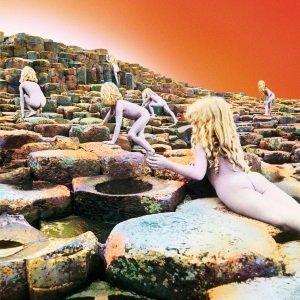
Houses of the Holy is the fifth studio album by the English rock band Led Zeppelin, released on 28 March 1973 in the United States and on 30 March 1973 in the United Kingdom by Atlantic Records. The album benefited from two band members installing studios at home, which allowed them to develop more sophisticated songs and arrangements and expand their musical style. Several songs subsequently became fixtures in the group's live set, including "The Song Remains the Same", "The Rain Song" and "No Quarter". Other material recorded at the sessions, including the title track, was shelved and released on the later albums Physical Graffiti (1975) and Coda (1982). All instruments and vocals were provided by the band members Robert Plant (vocals), Jimmy Page (guitar), John Paul Jones, and John Bonham (drums). The album was produced by Page and mixed by Eddie Kramer. The cover was the first for the band to be designed by Hipgnosis and was based on a photograph taken at Giant's Causeway in Northern Ireland.
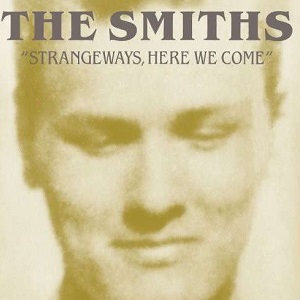
Strangeways, Here We Come is the fourth and final studio album by the English rock band the Smiths. It was released on 28 September 1987 by Rough Trade Records, several months after the group disbanded. All of the songs were composed by Johnny Marr, with lyrics written and sung by Morrissey.

Noel Scott Engel, better known by his stage name Scott Walker, was an American-British singer-songwriter and record producer who resided in England. Walker was known for his emotive voice and his unorthodox stylistic path which took him from being a teen pop icon in the 1960s to an avant-garde musician from the 1980s to his death. Walker's success was largely in the United Kingdom, where he achieved fame as a member of pop trio the Walker Brothers, who scored several hit singles, including two number ones, during the mid-1960s, while his first four solo albums reached the top ten during the later part of the decade, with the second, Scott 2, reaching number one in 1968. He lived in the UK from 1965 onward and became a UK citizen in 1970.

Max Webster was a Canadian hard rock band formed in Toronto in 1972. The band was relatively successful in Canada, with several best-selling albums, and had some minor success in the UK, before dissolving in 1981. The band's founder, Kim Mitchell, subsequently enjoyed a long and successful solo career in his native Canada. In 2023, the band was inducted into Canada's Walk of Fame.
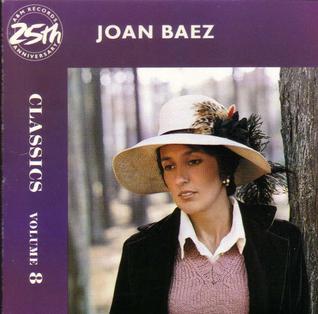
Joan Baez: Classics is a 1986 compilation, focusing on her A&M period (1972–76). Released in the mid-1980s, the album was significant for being the first Joan Baez compilation to appear on CD, and remains one of the more comprehensive collections of her 1970's work. The CD was part of A&M's series of compilations from artists associated with their label to commemorate their 25th anniversary.
"The Rain Song" is a song by the English rock band Led Zeppelin. It was released in March 1973 as the second track on their fifth album, Houses of the Holy.
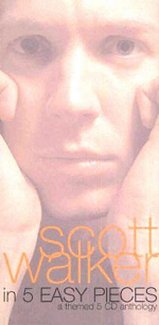
5 Easy Pieces is a box set anthology of the career of Scott Walker. It was released in November 2003. The set comprises five themed CDs and a 56-page booklet.

Climate of Hunter is the eleventh solo studio album by the American singer-songwriter Scott Walker. It was released in March 1984 and reached number 60 on the UK Albums Chart. It was his only album of the 1980s.

'Til the Band Comes In is the sixth solo studio album by the American singer-songwriter Scott Walker. It was released in December 1970 but failed to chart. Three singles were released from the album. The title track backed with "Jean the Machine" was released in the Netherlands. "Jean the Machine" and "Thanks For Chicago Mr. James" were each released in Japan. No singles were released in the UK. The release is a loose concept album about the inhabitants of a tenement.
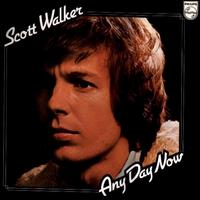
Any Day Now is the eighth solo studio album by the American singer Scott Walker. It was released in May 1973 but failed to chart. "The Me I Never Knew" was released as the album's sole single backed with the opening track of The Moviegoer; "This Way Mary". The album was also the final Walker studio album from Philips Records and he later signed with CBS Records.
"Make It Easy on Yourself" is a popular song written by Burt Bacharach and Hal David which was initially a hit for Jerry Butler in 1962. The best-known version is the 1965 recording by the Walker Brothers, for whom it was a No. 1 UK and Canadian hit. Dionne Warwick, who made a demo of the song in early 1962, later had a hit with it in 1970.
"The Impossible Dream (The Quest)" is a popular song composed by Mitch Leigh, with lyrics written by Joe Darion. It is the best known tune from the 1965 Broadway musical Man of La Mancha and is also featured in the 1972 film of the same name starring Peter O'Toole.

Scott: Scott Walker Sings Songs from his T.V. Series is the fourth solo album by American artist Scott Walker. It was released in June 1969 and reached number seven on the UK Albums Chart, his last album to make the top 10. No singles were released from the album, though some editions include Walker's top-twenty single; "Lights of Cincinnati". The album does not include original compositions by Walker and consists of performances of ballads and big band standards. The album has since been deleted and has not been reissued.

Nite Flights is the sixth and final studio album by American pop group the Walker Brothers, released in July 1978 by GTO Records. In contrast to their previous two albums, which were made up almost entirely of cover versions, Nite Flights is the group's only album to feature entirely original songs; Gary Walker contributed two while Scott Walker and John Walker each contributed four. In addition to containing all original material, the album was a radical departure from the group's usual mainstream sound, displaying elements of art rock, new wave and experimental music. It is generally considered an artistic breakthrough for Scott Walker, presaging his later re-emergence as an avant-garde artist.
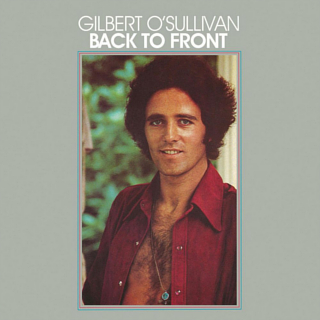
Back to Front is the second studio album by Irish singer-songwriter Gilbert O'Sullivan, released in October 1972 by MAM Records. The album follows the success of his 1971 debut album Himself and singles such as "Alone Again (Naturally)". Coinciding with the album, O'Sullivan abandoned his distinctive dress sense, which included a short cap and trousers, and instead presented himself as a more masculine, hairy-chested singer with a perm, wearing sweaters with the letter "G" emblazoned on them, which helped establish him as a sex symbol. O'Sullivan wrote the album's songs at home during night-time writing sessions, and recorded the album with his manager and producer Gordon Mills in London.

Scott Walker is the stage name of the American singer-songwriter Noel Scott Engel (1943–2019), former lead singer with The Walker Brothers. He lived in the United Kingdom from the 1960s until his death.
"Come Saturday Morning" is a popular song with music by Fred Karlin and lyrics by Dory Previn, published in 1969.

"Here's to You" is a song by Ennio Morricone and Joan Baez, released in 1971 as part of the soundtrack of the film Sacco & Vanzetti, directed by Giuliano Montaldo. The song was written by Baez and Morricone themselves. The lyrics are only four lines of text, sung over and over. The song became a freedom anthem, sung in demonstrations and featured in other media.

"Easy Now" is a pop rock song, written by the British rock musician Eric Clapton. He wrote and recorded the track for his 1970 studio album Eric Clapton for Polydor Records. The song was also released as the B-side to the singles "After Midnight" in 1970 and "Let It Rain" in 1972. The composition is also featured on the 1972 compilation album Eric Clapton at His Best. The recording was produced by Delaney Bramlett.
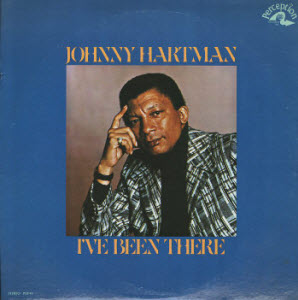
I've Been There is a studio album by American singer Johnny Hartman, released in 1973 by Perception Records. It was produced by Boo Frazier, and arranged and conducted by Tony Monte. Similar to his previous album – Today (1972) – Hartman includes several popular tunes by contemporary songwriters such as Paul Simon, Kris Kristofferson, and Antonio Carlos Jobim. Jazz musician Jimmy Heath is among the musicians on the album, performing on tenor saxophone and flute.
















